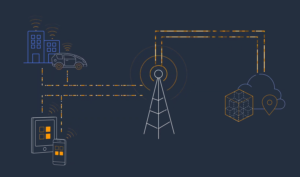
Verizon Expands Deal with AWS for 5G Edge Platform

(kkssr/Shutterstock)
Verizon added Denver and Seattle to the list of cities that will be the recipients of a mobile edge computing (MEC) platform called 5G Edge that it co-developed with Amazon Web Services to accelerate data processing–including machine learning on GPUs–on the edge. Connected cars, drones, and augmented reality use cases are expected to be among the early use cases.
Verizon’s 5G Edge platform is based on AWS’s Wavelength, an infrastructure offering that embeds AWS compute and storage services into the edge of a telecommunication company’s cell phone network. By keeping as much application traffic within Verizon’s network as possible–or what AWS is calling a “Wavelength Zone”–application owners can realize significant boost in performance, lower network latencies, and improved battery life compared to existing approaches.
Verizon rolled out its first 5G Edge platform on AWS Wavelength in August in Boston and San Francisco, and followed that up with implementations last year in Atlanta, Dallas, Las Vegas, New York, and Washington D.C. With the addition of Seattle, Washington and Denver, Colorado, Verizon now supports 5G Edge in 10 cities around the country, the company says.
Among the early customers for 5G Edge are HARMEN, Inception XR, and Skyward. HARMEN is using 5G to build a Cellular Vehicle-to-Everything (C-V2X) platform that that’s designed to improve communication with vehicles while they’re moving. The company says this will give drivers better warnings about road work restrictions or speed limits, as well as improve access to content.

AWS Wavelength deployments provide access to the full breadth of AWS services from the convenience of an edge data center
Inception XR is testing how Verizon’s 5G Edge stations can help accelerate the delivery of extended reality (XR) content to mobile users. “By delivering content that is rendered on a GPU a hundred times more powerful than the mobile device GPU, we can achieve an experience with millions of polygons streamed seamlessly with low latency giving the end user a truly unique experience,” Inception XR CEO Benny Arbel states in a Verizon press release.
Meanwhile, Verizon’s own drone subsidiary, called Skyward, is looking at how it can leverage the 5G Edge platform to improve drone operations. By sending video content from a drone-mounted virtual reality (VR) camera directly to the MEC over 5G, it can reduce the amount of hardware that the drone must carry, thereby extending its range.
Tami Erwin, the executive vice president and group CEO of Verizon Business, says the combination of AWS’s compute and storage services with her company’s 5G bandwidth will help usher in the Fourth Industrial Revolution for customers. “Together with AWS, we made 5G mobile edge compute real in 2020 and next year will bring even more MEC locations and increasing capabilities and toolsets for developers to grow the 5G MEC ecosystem,” she said in the December 28, 2020 press release.
Related Items:
Chip Startup Merges AI, 5G at the Edge



























